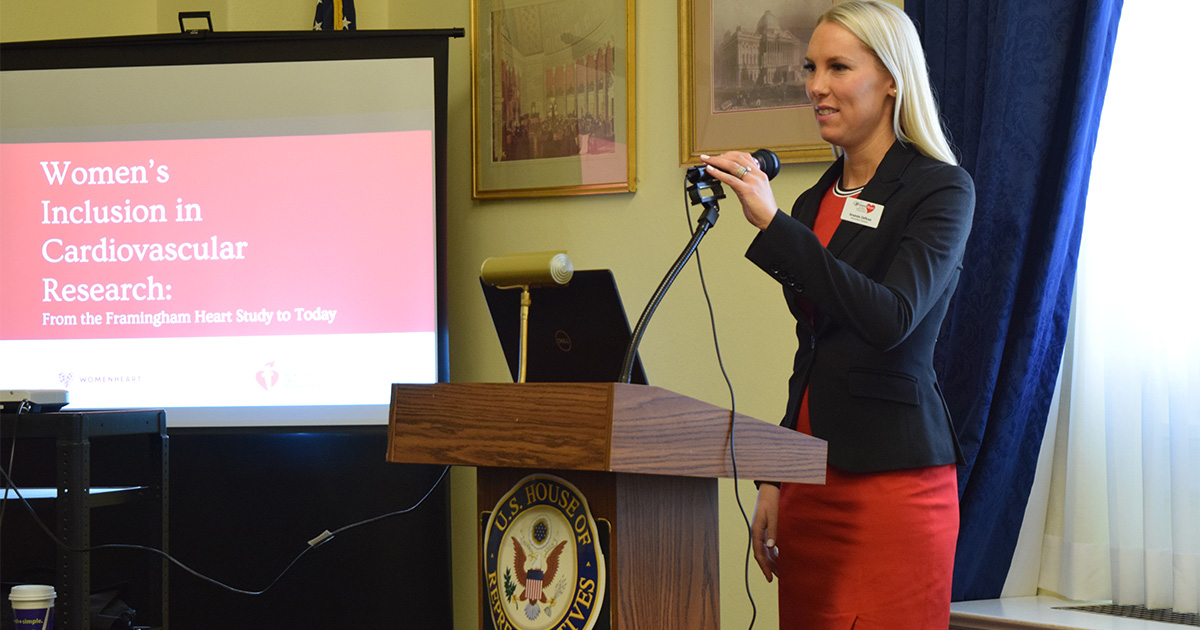Did you know that more than 60 million U.S. women — about 44% — are living with some form of heart disease? That stat, from the CDC, is certainly alarming, yet many women aren’t aware of this pervasiveness.

Celina Gorre
CEO, WomenHeart
“When we’re included in the research, we can learn how to recognize, diagnose, and treat various heart conditions in ways that are effective for women.”
Part of this is due to a lack of comprehensive, all-inclusive research on heart health. Unfortunately, clinical trials haven’t always embraced women, and current participation rates remain on the lower end.
“Research on heart disease must include women — particularly women of color and others from communities who experience a disproportionate rate of heart disease,” said Celina Gorre, CEO of WomenHeart — a national, patient-centered support and advocacy organization. “When we’re included in the research, we can learn how to recognize, diagnose, and treat various heart conditions in ways that are effective for women.”
Otherwise, she added, “women often experience missed and delayed diagnoses or less-than-optimal treatments — even today — because we were excluded from the research for too long.”
Pushing for more engagement
According to a recent study by Harvard Medical School researchers at Brigham and Women’s Hospital, only 41.2% of 302,664 participants (across 1,433 clinical trials focused on cardiovascular, psychiatric, and cancer-related illnesses) were female. Additionally, the study found that while “49% of the cardiovascular-disease patient population is female, only 41.9% of trial participants were female.”
Back in 1977, a Food and Drug Administration (FDA) policy endorsed the notion that women of childbearing potential should be excluded from Phase I and early Phase II drug studies. It was thanks to a new law passed by Congress in 1993 that the National Institutes of Health started intentionally to include women of all ages in clinical research.
But more work needed to be done. Enter organizations like WomenHeart. As pointed out by Gorre, WomenHeart “has been engaged over the last two decades in helping to pass legislation that requires the FDA and NIH to increase women’s participation in clinical trials and medical research — and to report the outcomes.”
“One example of our work,” she added, “is [making the] case for including pregnant and lactating women in clinical trials. Increasingly, women with existing heart conditions are becoming pregnant and, in other cases, pregnant women are developing heart conditions. We must have a deep understanding of how to treat those heart conditions during pregnancy — and we can only do that when pregnant women are included in the research.”

Aiming for the heart
Even if some women are initially hesitant — or fully skeptical — when it comes to joining heart-health trials for various reasons, those who do soon realize that the benefits are manifold. Just speak with any WomenHeart Champion, such as Amanda DeRosa, who participated in a Yale research study for people with long QT syndrome (LQTS).
“When I first started in the study, it was emotionally difficult — a daily reminder of my disease that puts me at risk for sudden cardiac arrest and [a signal of] my new limitations,” DeRosa said. “But over time, I became proud of my participation. As a mother to a child who also has this same disease, I knew the results of this research would help not only me, but other women and future generations [too].”
And WomenHeart’s mission is far from complete. The organization continues to set forth pro-participation policies while delineating how to best make those happen, such as encouraging researchers to prioritize inclusive participation from the beginning stages of trial design.
“It’s critical that you meet potential patients where they are and in ways that build trust and understanding,” Gorre said. “But if you get too far along in the trial-design process before you consider those factors, it may be too late to overcome barriers that typically lead to low participation by women.”


